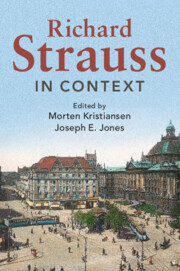Book contents
- Richard Strauss in Context
- Composers in Context
- Richard Strauss in Context
- Copyright page
- Contents
- Figures
- Notes on Contributors
- Preface
- Note on Translation
- Part I Family, Friends, and Collaborators
- Part II Career Stations
- Chapter 9 Munich and Garmisch
- Chapter 10 Meiningen and Weimar
- Chapter 11 Bayreuth
- Chapter 12 Berlin
- Chapter 13 Vienna
- Part III Cultural Engagement and Musical Life
- Part IV Professional and Musical Contexts
- Part V In History
- Part VI Artifacts and Legacy
- Further Reading
- Appendix: Letters Bibliography
- Index
Chapter 11 - Bayreuth
from Part II - Career Stations
Published online by Cambridge University Press: 08 October 2020
- Richard Strauss in Context
- Composers in Context
- Richard Strauss in Context
- Copyright page
- Contents
- Figures
- Notes on Contributors
- Preface
- Note on Translation
- Part I Family, Friends, and Collaborators
- Part II Career Stations
- Chapter 9 Munich and Garmisch
- Chapter 10 Meiningen and Weimar
- Chapter 11 Bayreuth
- Chapter 12 Berlin
- Chapter 13 Vienna
- Part III Cultural Engagement and Musical Life
- Part IV Professional and Musical Contexts
- Part V In History
- Part VI Artifacts and Legacy
- Further Reading
- Appendix: Letters Bibliography
- Index
Summary
From the last quarter of the nineteenth century on, the name Bayreuth has stood for the realization of a new kind of musical theater developed by Richard Wagner, which ever since has been recognized as a major contribution to the world’s cultural heritage. For Strauss, both Wagner and Bayreuth were profoundly influential. In his early years, he believed he could see in it the fulfilment of his aesthetic ideals, and accordingly, he sought closeness to the milieu of the idolized “Master.” With increasing maturity, however, it became clear to him that although Wagner was one of the fixed stars in his musical and dramatic thinking, the “Wahnfried ideology” would remain foreign to his nature. As early as his time in Weimar, the “cult of Wagner” seemed to be something alien to Strauss, something he would overcome. In juxtaposition to the formative Bayreuth episode in Strauss’s early years, his two short engagements in 1933–34 take on the dubious appearance of a moral lapse.
- Type
- Chapter
- Information
- Richard Strauss in Context , pp. 96 - 104Publisher: Cambridge University PressPrint publication year: 2020

